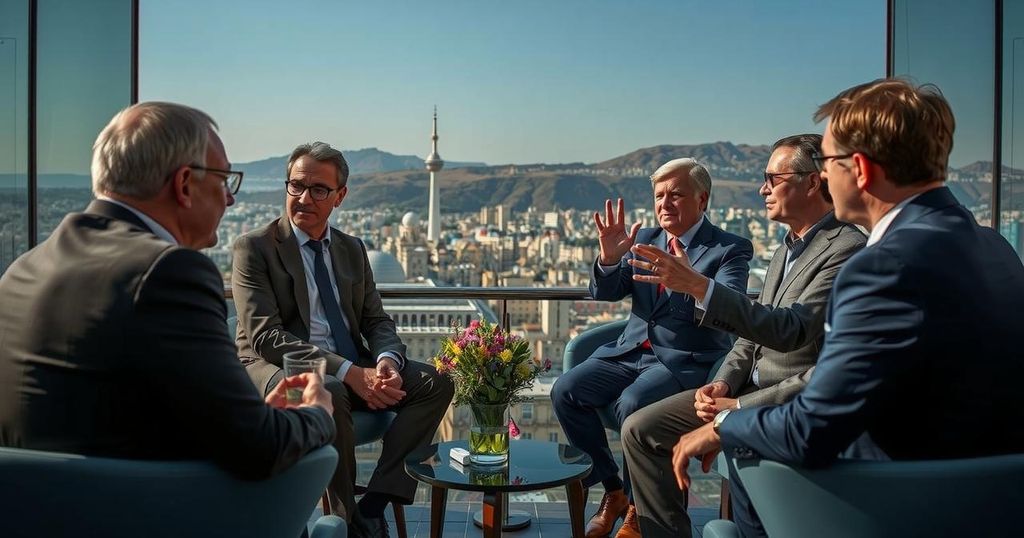U.S. Secretary of State Antony Blinken will meet with Israeli leaders to revive Gaza cease-fire discussions, enhance humanitarian access, and address conflict with Hezbollah in Lebanon. His visit follows failed negotiations and highlights ongoing humanitarian concerns, despite uncertainties surrounding future talks. Blinken will also visit Jordan, while U.S. envoy Amos Hochstein seeks to redefine the Lebanon-Israel conflict’s approach.
U.S. Secretary of State Antony Blinken is scheduled to engage with Israeli leaders on Tuesday in an effort to reinvigorate the stalled negotiations surrounding a cease-fire in Gaza. His objectives include facilitating enhanced humanitarian access to Gaza and mitigating the conflict involving Israel and Hezbollah in Lebanon. This marks Blinken’s eleventh visit to the region since hostilities in Gaza commenced in October 2023. On his agenda is a meeting with Israeli Prime Minister Benjamin Netanyahu and Defense Minister Yoav Gallant. Despite months of discussions, mediated by the United States, Egypt, and Qatar, attempts to achieve a cease-fire and secure the release of hostages held by Hamas have been unsuccessful. A senior official from the State Department indicated that the likelihood of quickly resuming these negotiations seems bleak, particularly in light of Israel’s recent elimination of Hamas leader Yahya Sinwar. In addition to his talks in Israel, Blinken is anticipated to visit Jordan on Wednesday. The official noted that without a cease-fire, discussions with Arab leaders would focus on shaping proposals for Gaza’s governance post-conflict. The U.S. reportedly possesses components of a post-conflict strategy ready for discussion with Israeli officials. According to Nimrod Goren, a senior fellow for Israeli Affairs at the Middle East Institute, significant disparities remain between Israeli and Hamas positions regarding potential cease-fire terms. He expressed skepticism about achieving a diplomatic breakthrough during Blinken’s visit. “The gaps are major; basically, Israel wants Hamas not to govern Gaza anymore and not to exist in Gaza anymore as a security threat, and Hamas wants the opposite,” said Goren. The deteriorating humanitarian conditions in northern Gaza were underscored by a State Department representative, who stated, “Certainly, nobody in the U.S. government is going to stand in front of you and say that we are satisfied or find the humanitarian situation in any part of Gaza satisfactory.” In efforts related to the Israel-Lebanon conflict, U.S. envoy Amos Hochstein attended discussions in Beirut aimed at resolving tensions along the border. Hochstein characterized his meeting with Lebanese parliament speaker Nabih Berri as “constructive” and indicated his intent to engage with government and military officials in Lebanon, aiming to steer the country towards a new direction of stability and economic prosperity. He reiterated the importance of implementing U.N. Security Council Resolution 1701, which calls for the withdrawal of Hezbollah fighters and Israeli forces from Lebanon. Hochstein remarked that merely committing to the resolution’s implementation is insufficient, emphasizing the need to foster mutual confidence that the resolution will be faithfully enacted. He also acknowledged the desire of the Lebanese people for peace and security, stating, “The people of Lebanon, like everyone in the region, just want to go home, build a peaceful, secure and safe prosperous future for themselves and their families.” Following the initiation of the conflict by Hamas on October 7, which resulted in significant casualties, Israel’s military response in Gaza has reportedly resulted in over 42,600 Palestinian fatalities, according to the Gaza Health Ministry. The United States, the United Kingdom, the European Union, and other international entities have designated both Hezbollah and Hamas as terrorist organizations.
The ongoing conflict in Gaza and its spillover into Lebanon has prompted an urgent response from international diplomats. U.S. Secretary of State Antony Blinken’s visit highlights America’s role in mediating peace efforts amid ongoing violence. The backdrop of this situation involves a complex interplay of regional power dynamics, humanitarian crises, and historical tensions between Israel, Hamas, and Hezbollah, which have considerably shaped the landscape of Middle Eastern geopolitics.
In conclusion, Secretary Blinken’s visit emphasizes the critical need for renewed dialogue to de-escalate tensions in Gaza and Lebanon. Despite the daunting challenges, including stark differences in cease-fire conditions between Israel and Hamas, the United States remains committed to facilitating humanitarian access and discussing governance strategies for Gaza. The unfortunate humanitarian situation underscores the urgency of these diplomatic efforts in order to pave the way for peace and stability in the region.
Original Source: www.voanews.com







